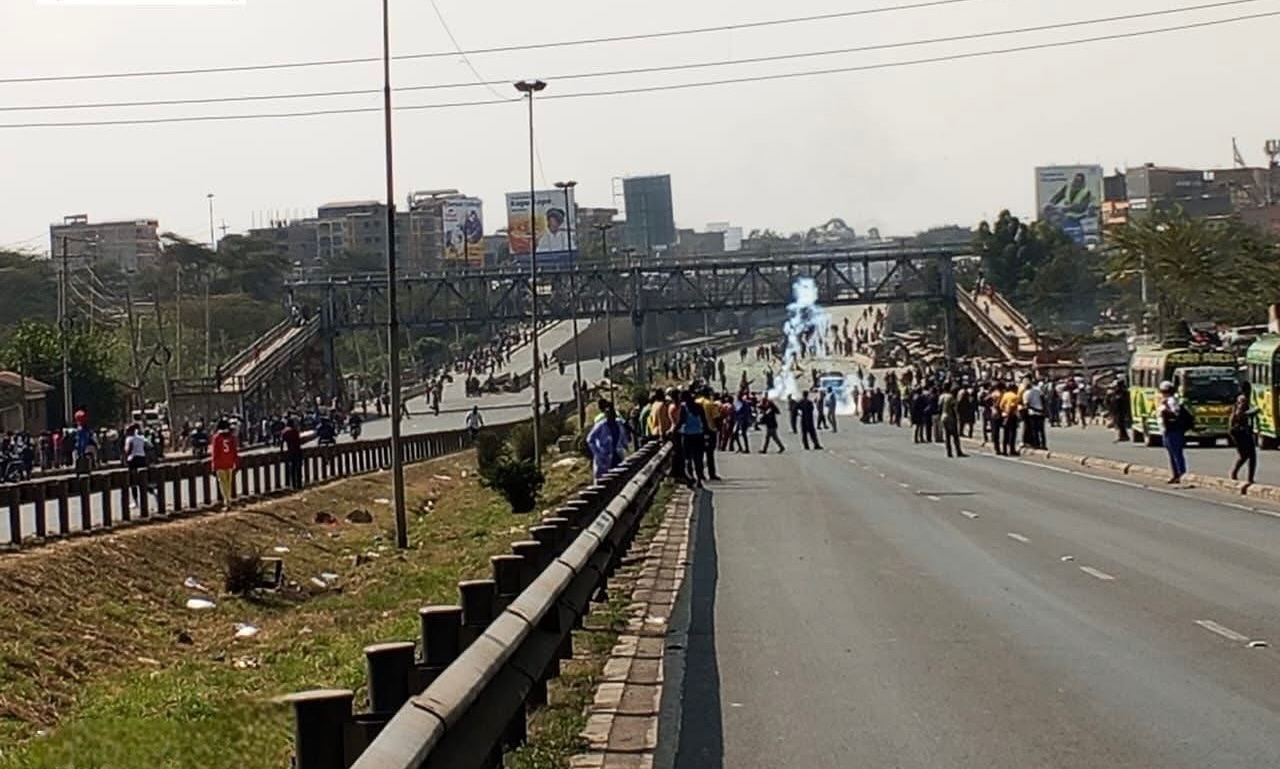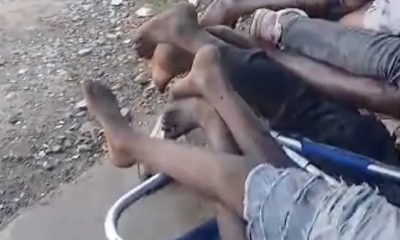Investigations
How Lethal Gang Wars Are Holding Outering Road Hostage With Blood
Youths wielding machetes and glass bottles turned the once-busy matatu terminus into a war zone, setting up roadblocks and attacking pedestrians and vehicles indiscriminately.

Nairobi’s Outering Road, once a bustling arterial highway connecting the city’s eastern suburbs, has transformed into a battlefield where machete-wielding youth gangs wage daily wars that have left commuters terrorized and businesses counting losses in the millions.
In just the past two weeks, rival groups from Huruma and Kiamaiko have engaged in violent confrontations twice, forcing police to intervene and bringing traffic to a complete standstill along the critical transport corridor. The latest eruption occurred on Monday afternoon when violent clashes broke out between the rival factions, prompting a swift response from police who remained heavily deployed until calm returned by 5pm.
The confrontations, which began between Allsops and the Kariobangi Roundabout, quickly spread to the Riverside area, creating what witnesses describe as scenes of urban warfare. Youths wielding machetes and glass bottles turned the once-busy matatu terminus into a war zone, setting up roadblocks and attacking pedestrians and vehicles indiscriminately.
Social media users issued urgent security alerts warning motorists to avoid Outering Road entirely as the violence escalated. The protesters’ aggressive tactics forced authorities to deploy heavy police presence throughout the area, though questions remain about the effectiveness of law enforcement response given the recurring nature of these incidents.
Mary Wanjiku, a vegetable vendor who operates near the Kariobangi roundabout, has watched her livelihood crumble as the violence intensifies. “I haven’t opened my stall for three days,” she explains, her voice heavy with frustration. “Every time I try to come to work, there’s fighting. My family depends on this business, but it’s too dangerous now.”
Her story echoes across the area where local businesses report significant losses as customers avoid the zone entirely. Matatu operators, who form the backbone of public transport along this route, have been forced to seek alternative routes, disrupting schedules and increasing costs for commuters who can least afford it.
The territorial disputes run deeper than mere turf wars. Investigations reveal that the groups are fighting over control of the local bus stage in Kariobangi, a strategic asset that represents lucrative income through extortion rackets and illegal taxes on matatu operators. Sources within the local administration, speaking on condition of anonymity, indicate these conflicts have roots in the drug trade and competition for influence over youth unemployment programs that channel government resources to the area.
The economic ripple effects extend far beyond the immediate battleground. Each hour of disruption along Outering Road costs the economy approximately Sh50 million in lost productivity and delayed deliveries, according to the Kenya Association of Manufacturers. The road becomes impassable for several hours during each incident, affecting supply chains and forcing businesses to absorb additional transportation costs that ultimately get passed to consumers.
Dr. James Kimani, a criminologist at the University of Nairobi, argues that current security measures barely scratch the surface of this crisis. “These young people are not inherently violent,” he explains. “They are products of systemic failures including lack of opportunity, poor governance, and the absence of legitimate channels for economic advancement.”
The recurring violence reveals the inadequacy of purely reactive approaches. Despite heavy police deployment after each incident, the confrontations continue with predictable regularity, suggesting that law enforcement alone cannot address the underlying grievances that fuel gang recruitment.
Local community leaders are calling for urgent intervention from county and national government authorities to establish permanent peace-building mechanisms and economic empowerment programs targeting at-risk youth in Huruma and Kiamaiko settlements. Without such comprehensive intervention, they warn, the cycle of violence will only intensify.
As Nairobi continues to grow as East Africa’s commercial hub, the transformation of Outering Road into a gang battleground represents a critical test of Kenya’s ability to maintain security in its urban centers. The blood spilled on this vital artery threatens to spread instability throughout the metropolitan area if authorities fail to act decisively.
For now, Outering Road remains hostage to cycles of violence that have made ordinary Kenyans prisoners in their own city, afraid to traverse routes they once considered safe. Until the root causes of youth marginalization and economic desperation are addressed, this critical transport corridor will continue to run red with the blood of a generation lost to gang warfare.
The question facing authorities is no longer whether they can restore temporary order to Outering Road, but whether they possess the political will and resources to tackle the systemic issues that have turned Kenya’s youth into enemies of their own communities. The answer will determine not just the fate of one road, but the future of urban security across the nation.
Kenya Insights allows guest blogging, if you want to be published on Kenya’s most authoritative and accurate blog, have an expose, news TIPS, story angles, human interest stories, drop us an email on [email protected] or via Telegram
-

 Business5 days ago
Business5 days agoKakuzi Investors Face Massive Loss as Land Commission Drops Bombshell Order to Surrender Quarter of Productive Estate
-

 Investigations6 days ago
Investigations6 days agoINSIDER LEAK REVEALS ROT AT KWS TOP EXECUTIVES
-

 Investigations3 days ago
Investigations3 days agoCNN Reveals Massive Killings, Secret Graves In Tanzania and Coverup By the Govt
-

 Politics2 weeks ago
Politics2 weeks agoRuto Set to Dominate ODM@20 in Mombasa, Positioning Himself as Raila Odinga’s Political Heir Ahead of 2027
-

 Business6 days ago
Business6 days agoBANKS BETRAYAL: How Equity Bank Allegedly Helped Thieves Loot Sh10 Million From Family’s Savings in Lightning Fast Court Scam
-

 News7 days ago
News7 days agoEXPOSED: How Tycoon Munga, State Officials, Chinese Firm Stalled A Sh3.9 Trillion Coal Treasure In Kitui
-

 News6 days ago
News6 days agoEx-Boyfriend Withdraws Explosive Petition to Remove DPP After Criminal Case Against Capital FM Boss Resurfaces
-

 Politics5 days ago
Politics5 days agoI Had Warned Raila Of Possible Fallout In The Odinga Family After His Death, Oburu Says



















